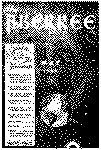Volume 6, Issue 2, page 7
If You Let the Salesman Sell You a Cadillac, Are You Damned Because'
You Don't Harness Your Horse as Does the Guy Who Bought a Buggy?
By ALPHIA HART
JUST AS there were and are persons
stuck in childhood incidents, or
engrains, or even past lives, the
"Sort of History of Dianetics"
by Bob Arentz convinces me that
Book One , "Dianetics , the Modern Science
of Mental Health", itself can be an engram .
Records of past illnesses, failures,
disappointments, a n d disillusionments,
were burned at the shrine of Book One's
promises, and under the emotional spasms
of expected miracles, a master fiction
writer became a more powerful "ally" than
Grandpa, Uncle Joe, or the interfering
neighbor.
Half of those who read Book One and
swallowed it with the enthusiasm of a
thirsty mariner gulping down the driplets
of a spring freshet, knew before they lay
down on a fellow fiend's cot that they
were going to find evidences that their
mothers tried to murder them with icepicks before they were born, that chattering doctors and nurses were to blame
for half their ills and compulsions, and
that the other half could be traced quickly and easily to various periods of coma
and unconsciousness thruout their developing years. It was all so simple; "The
Book" said so . And "the ally" -- in this
case a volume of rosy promises -- could do
no wrong.
This is no intent to disparage Book
One, nor the" science" it sold at $4 the
copy. I, too, bought the book, and since
I was skating on the thin ice of acute
high blood pressure -- an d "less than a
year to live", as doctors so generously
insisted -- I was ripe for anything that
offered a ray of hope. I swallowed it all,
talked of it in glowing terms to-friends,
and was just as disgusted as other worshippers when these friends didn't flock
to my side in a mutual exchange of miraculous cures.
But reading a book wasn't enough. I
was desperate. I wanted action, and wanted
it fast. Already I had wasted thousands
on doctors, sanitariums, and hospitals --
and my "year" (if doctors were to be believed) had expired. I was living on time
that should have been mouldering my bones .
I went to Wichita, stopped at the Hubbard Foundation, and after a short wait
in the lobby, was ushered into the office
of Ross Lamoreaux, director of training.
I explained what doctors had said was
wrong with me, and said I wanted some
(ED. NO2B -- We interrupt this series tc
defend the "poor" auditor-aspirant whose
faith in the future of Dianetics went beyond spending $4 for Book 1. Apparently;
they were working under the hallucinatioi
that if a drink of water was so good fos
you, maybe a bath in the stuff would be
better. Which makes this a sort of immersion-sprinkling debate, with a net
twist.)
auditing . Would it help?
Ross nodded, looked at my glasses, and
said, in a low, slow drawl: "Simple. I
don't know if we can take your glasse:
off, tho."
"To hell with my glasses!" I said. "If
I can get rid of my high blood pressure;
I can buy glasses. They don't bother me.'
Ross suggested I take the training
course, rather than the auditing. "You'll
get enough co-auditing during class tc
take care of your case," he said. "And
besides, you'll have the training."
I left, elated, with an agreement tc
return in January at the opening of a nev
class. Of all the thousands I'd spent
this was the first definite pledge that
something good might happen. And for thE
next few weeks, that was all I could think
about: I was going to have a miracle performed on me; I was going to be in a position to perform miracles on the hundreds of medical sacrifices I'd shared
hopeless hours with the last few months,
Life, indeed ( and Mr. Hubbard, and Mr
Lamoreaux, and the Wichita Foundation
and my boss for letting me off six weeks;
was wonderful. Simply wonderful!
Our classes started January 7, 1952
We listened to tapes, with amplificatior
by David MacLean, the instructor. That
afternoon, I was assigned an advancec
student for an auditor. For two hours, it
one of the little auditing rooms, he listened open-mouthed while I reviewed r
life of adventure and events. When I hat
finished , he said : "You've certainly
lived an interesting life, Mr. Hart."
"Hunh?" I asked .
"I said, you've certainly lived an interesting life," he repeated. I glance(
at the notepad he'd borrowed from me or
which he had written one line: "First
marriage unhappy." That was all.
"You mean, that's auditing?" I asked
I could hardly believe it.
He nodded, and we went out into th(
lobby. I was stunned. Had I paid $500 for
the "privilege" of entertaining fellov
students?
The second blow came that night. L


